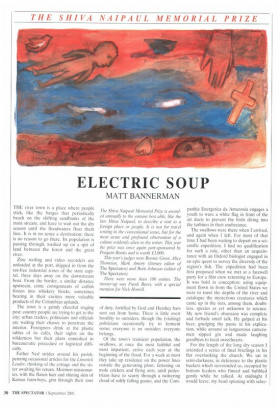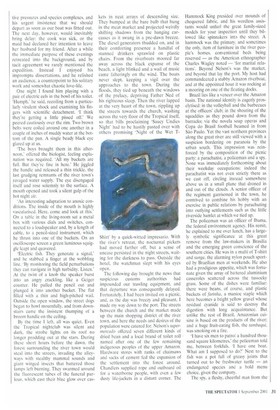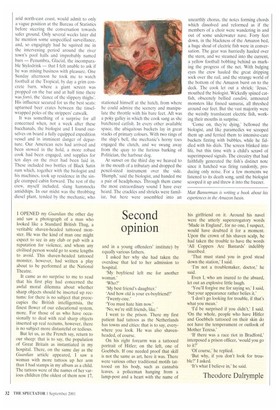ELECTRIC SOUP
MATT BANNERN1AN
THE river town is a place where people stick, like the barges that periodically beach on the shifting sandbanks of the main stream, and have to wait out the dry season until the floodwaters float them free. It is in no sense a destination; there is no reason to go there. Its population is passing through, washed up on a spit of land between the forest and the great river.
Zinc roofing and video recorders are unloaded at the port, shipped in from the tax-free industrial zones of the state capital, three days away on the downstream boat. From the border, a similar distance upstream. come consignments of catfish frozen into whiskery blocks, sometimes bearing in their cavities more valuable products of the Colombian uplands.
The town is a grimly cheerful staging post: country people are trying to get to the city; urban traders, politicians and officials are waiting their chance to penetrate the interior. Foreigners drink at the plastic tables of its cafés, their sights on the wilderness but their plans enmeshed in bureaucratic procedure or logistical difficulty.
Father Ned strides around his parish, penning occasional articles for the Limerick Leader, thinking of the cottage and the sister awaiting his return. Mormon missionaries, with the flaxen hair and shining skin of Kansas farm-boys. grin through their tour
The Shiva Naipaul Memorial Prize is awarded annually to the entrant best able, like the late Shiva Naipaul, to describe a visit to a foreign place or people. It is not for travel writing in the conventional sense, but for the most acute and profound observation of a culture evidently alien to the writer. This year the prize was once again part-sponsored by Penguin Books and is worth £3,000.
This year's :fudges were Bonnie Greer, Alice Thomson, Mark Amory (literary editor of The Spectator) and Boris Johnson (editor of The Spectator).
There were more than 100 entries. The runner-up was Frank Bures, with a special mention for Nick Horrell.
of duty, fortified by God and Hershey bars sent out from home, There is little overt hostility to outsiders, though the (visiting) politicians occasionally try to ferment some; everyone is an outsider; everyone belongs.
Of the town's transient population, the swallows, at once the most faithful and most impatient, arrive each year at the beginning of the flood. For a week at most they take up residence on the power lines outside the generating plant, fattening on mole crickets and flying ants, until pedestrians have to scurry through a twittering cloud of softly falling guano, and the Corn panhia Energetica da Amazonia engages a youth to wave a white flag in front of the air ducts to prevent the birds diving into the turbines in their exuberance.
The swallows were there when I arrived, and again when I left. For most of that time I had been waiting to depart on a scientific expedition. I had no qualification for such a role, other than an acquaintance with an Oxford biologist engaged in an epic quest to survey the diversity of the region's fish. The expedition had been first proposed when we met at a farewell party for a film crew returning to Europe. It was bold in conception: using equipment flown in from the United States we were to trawl the depths of the river and catalogue the mysterious creatures which came up in the nets, among them, doubtless, species as yet unknown to science. My new friend's obsession was complete and forbade small talk. He gulped at his beer, grudging the pause in his explication, while around us languorous cameramen sipped gin and made laughing goodbyes to local sweethearts.
For the length of the long dry season I attended a series of final briefings in his flat overlooking the church. We sat in semi-darkness, in deference to the plastic buckets which surrounded us, occupied by bottom feeders who finned and bubbled gently while he talked. At midnight I would leave, my head spinning with selec
tive pressures and species complexes, and his urgent insistence that we should depart as soon as our boat was fitted out. The next day, however, would inevitably bring delay: the cook was sick, or the maid had declared her intention to leave her husband for my friend. After a while the immediate purpose of these evenings retreated into the background, and by tacit agreement we rarely mentioned the expedition. Instead I enjoyed his impromptu dissertations, and he relished an audience, a counterpoint to his solitary work and somewhat chaotic love-life.
One night I found him playing with a pair of electric eels in the bowl of his toilet. 'Humph.' he said, recoiling from a particularly virulent shock and examining his fingers with scientific detachment. 'I think they're getting a little pissed off.' We peered cautiously over the rim. Two brown belts were coiled around one another in a couple of inches of muddy water at the bottom of the pan. A single beady black eye glared up at us.
'The boys brought them in this afternoon. offered the biologist, feeling explanation was required. 'All my buckets are full. But they're fine in here.' He jiggled the handle and released a thin trickle, the last grudging remnants of the river town's ravaged water supply. The eye disengaged itself and rose solemnly to the surface. A mouth opened and took a silent gulp of the hot night air.
'An interesting adaptation to anoxic conditions. The inside of the mouth is highly vascularised. Here, come and look at this.' On a table in the living-room sat a metal box with various dials and switches, connected to a loudspeaker and, by a length of cable, to a pencil-sized instrument, which he thrust into one of the buckets. On an oscilloscope screen a green luminous squiggle leapt and quavered.
'Electric fish. They generate a signal,' and he stabbed a finger at the wobbling line, By monitoring the field perturbations they can navigate in high turbidity. Listen.' At the twist of a knob the speaker burst into an angry crackling, like a Geiger counter. He pulled the pencil out and plunged it into another bucket. The flat filled with a thin and high-pitched wail. Outside the open window, the street dogs began to howl mournfully, and from downstairs came the insistent thumping of a broom handle on the ceiling.
By the time I left, all was quiet. Even the Tropical nightclub was silent and dark, the strobe lights on its roof no longer prodding out at the stars. During these short hours before the dawn, the forest surrounding the river town would steal into the streets, invading the alleyways with stealthy mammal sounds and giant winged insects that battered those lamps left burning. They swarmed around the fluorescent tubes of the funeral parlour, which cast their blue glow over cas
kets in neat arrays of descending size. They bumped at the bare bulb that hung in the meat market and projected weirdly shifting shadows from the hanging carcasses as it swung in a pre-dawn breeze. The diesel generators thudded on, and in their comforting presence a handful of stunned drinkers sprawled on plastic chairs. From the riverboats moored far away across the black expanse of the beach, a light blinked and a wail of music came falteringly on the wind. The boats never slept, keeping a vigil over the approaches to the town. During the floods, they tied up beneath the windows of the prelacy, depriving Father Ned of his righteous sleep. Then the river lapped at the very heart of the town, rippling up the streets towards the church, washing across the very floor of the Tropical itself, so that bills proclaiming 'Saucy Undies Night' had to be hastily pasted over with others promising 'Night of the Wet T Shirt' by a quick-witted impresario. With the river's retreat, the nocturnal pickets had moved farther off, but a sense of unease persisted in the night streets, waiting for the darkness to pass. Outside the hotel, the watchman slept with his eyes open.
The following day brought the news that suspicious customs authorities had impounded our trawling equipment, and that departure was consequently delayed. Fortunately, I had been invited on a picnic, and, as the day was breezy and pleasant. I made my way down to the port. The streets between the church and the market made up the main shopping district of the river town, and here the needs and desires of the population were catered for. Nelson's supermercado offered seven different kinds of dried bean and a local brand of toilet roll named after one of the few remaining indigenous peoples of the upper Amazon. Hardware stores with ranks of chainsaws and sacks of cement fed the expansion of the settlement into the forest around. Chandlers supplied rope and outboard oil for a waterborne people, with even a few dusty life-jackets in a distant corner. The
Hammock King presided over mounds of chequered fabric, and his wordless assistants would unfurl the great family-sized models for your inspection until they billowed like spinnakers into the street. A hammock was the primary, and sometimes the only, item of furniture in the river people's homes, conventional beds being reserved — as the American ethnographer Charles Wagley noted — 'for marital relations'. Beyond Nelson's was the market. and beyond that lay the port. My host had commandeered a stubby Amazon riverboat, and at the appointed hour it was rocking at a mooring on one of the floating docks.
Brazil lies like a veneer over the Amazon basin. The national identity is eagerly proselytised: in the volleyball and the barbecues at the officers' club; in the shouting of the squaddies as they pound down from the barracks; via the novela soap operas and Copa do Brasil football beamed in from Sao Paulo. Yet the vast northern provinces along the great river are still viewed with a suspicion bordering on paranoia by the urban south. This impression was reinforced by the composition of the picnic party: a parachutist, a policeman and a spy. None was immediately forthcoming about their weekday occupations; indeed the parachutist was not even strictly there as we cast off, circling instead somewhere above us in a small plane that droned in and out of the clouds. A senior officer of the regiment garrisoned in the town, he contrived to combine his hobby with an exercise in public relations by parachuting into outlying settlements such as the little riverside hamlet at which we tied up.
The policeman was an officer of Ibama, the federal environment agency. His remit, he explained to me over lunch, has a largely symbolic significance at this great remove from the law-makers in Brasilia and the emerging green conscience of the southern cities. He was in a mufti of T-shirt and sunga, the alarming nylon pouch sported by Brazilian men at weekends. He also had a prodigious appetite, which was fortunate given the array of battered aluminium casseroles scattered across the tussocky grass. Some of the dishes were familiar: there were beans, of course, and plastic buckets of farinha, a manioc staple which here becomes a bright yellow gravel whose residual cyanide is said to destroy the digestion with long acquaintance. But unlike the rest of Brazil. Amazonian cuisine is based on the products of the river; and a huge fruit-eating fish, the tambaqui, was smoking on a fire.
'I have six men to patrol a hundred thousand square kilometres,' the policeman told me, between forkfuls. 'I have one boat. What am I supposed to do?' Next to the fish was a pot full of greasy joints that turned out to be freshwater turtle — an endangered species and a bold menu choice, given the company.
The spy, a fleshy, cheerful man from the
arid north-east coast, would admit to only a vague position at the Bureau of Statistics before steering the conversation towards safer ground. Only several weeks later did he mention some unspecified surveillance, and, so engagingly had he squired me in the intervening period around the river town's pool halls and improbably named bars — Penumbra, Glacial, the incomparable Stylodrink — that I felt unable to ask if he was mixing business with pleasure. One Sunday afternoon he took me to watch football at the Tropical, by day a grim concrete barn, where a giant screen was propped on the bar and at half time there was forro, the 'dance of the slippery thighs'. His influence secured for us the best seats: upturned beer crates between the tinselwrapped poles of the strippers' catwalk.
It was something of a surprise for all concerned when, not a week after these bacchanals, the biologist and I found ourselves on board a fully equipped expedition vessel and in imminent danger of departure. Our American nets had arrived and been stowed in the hold, a more robust cook had been engaged, and supplies for ten days on the river had been laid in. These included two bottles of Black Satin rum which, together with the biologist and his machines, took up residence in the single cramped cabin forward. The rest of the crew, myself included, slung hammocks amidships. In our midst was the throbbing diesel plant, tended by the mechanic, who stationed himself at the hatch, from where he could admire the scenery and manipulate the throttle with his bare feet. Aft was a poky galley in which the cook sang as she butchered catfish. In every other available space, the ubiquitous buckets lay in great stacks of primary colours. With two rings of the ship's bell, the mechanic's horny toes engaged the clutch, and we swung away from the quay to the furious barking of Politician, the harbour dog.
At sunset on the third day we heaved to in the mouth of a tributary and dropped the pencil-sized instrument over the side. 'Humph,' said the biologist, and handed me a pair of headphones. Through them came the most extraordinary sound I have ever heard. The crackles and shrieks were familiar, but here were assembled into an
unearthly chorus, the notes forming chords which dissolved and reformed as if the members of a choir were wandering in and out of some underwater nave. Forty feet down, in the blackness of the Amazon bed, a huge shoal of electric fish were in conversation. The gear was hurriedly hauled over the stern, and we steamed into the current, a yellow football bobbing behind us marking the progress of the net. With bulging eyes the crew hauled the great dripping sock over the rail, and the strange world of the bottom of the Amazon burst on to the deck. The cook let out a shriek; 'Jesus,' mouthed the biologist. Wickedly spined catfish, obscenely bellied candira, armoured monsters like finned samurai, all threshed around our feet. But the vast majority were the weirdly translucent electric fish, working their mouths in surprise.
`Come on, they're dying,' bellowed the biologist, and like paramedics we scooped them up and ferried them to intensive-care buckets fizzing with bubbles, while he fiddled with his dials. The screen blinked into life, but this time with a child's scrawl of superimposed signals. The circuitry that had faithfully generated the fish's distinct note since it hatched was firing randomly, producing only noise. For a few moments we listened to its death song, until the biologist scooped it up and threw it into the freezer.
Matt Bannerman is writing a book about his experiences in the Amazon basin.




























































 Previous page
Previous page